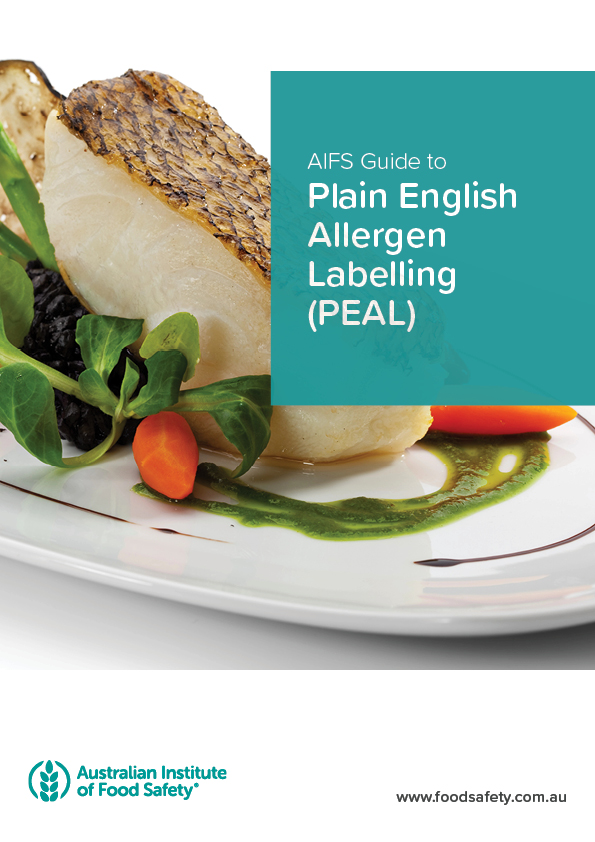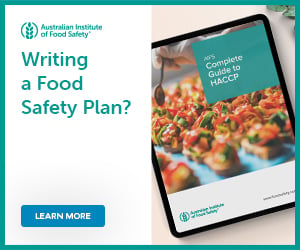
Allergen declarations can be a matter of life and death. It’s vital that food labels are accurate and easy to understand so that consumers can make safer food choices and avoid severe allergic reactions.
The following guide contains critical information regarding this topic, outlining the latest labelling requirements for Australian food businesses.
Introduction
It’s estimated that food allergies currently affect approximately 1 in 10 children, and 1 in 50 adults in Australia. In some instances, these allergic reactions can result in severe illness or even death.
Allergic reactions are not to be taken lightly, and food businesses must do all they can to mitigate the risks through robust allergen management procedures, including allergen declarations and labelling.
Allergen declarations are used by food businesses to warn consumers that an allergen is present in a product. Providing accurate allergen information is not just a legal requirement; it is also a crucial aspect of customer service and safety. Mislabelling or under-reporting allergens such as eggs, milk, peanuts and shellfish can have serious health implications for consumers, particularly those with severe allergies.
To guide businesses towards a safer, more consistent standard of food allergen labelling, Food Standards Australia New Zealand (FSANZ) has established new legislation mandating the use of Plain English Allergen Labelling (PEAL).
Food Allergen Rules
All food businesses are responsible for managing the presence of allergens in their food and must follow the specific rules set out in the Australia New Zealand Food Standards Code.
The rules are strict because consumers with allergies can experience severe allergic reactions which may cause death. These consumers rely on food labels and information provided by retailers and suppliers to check whether a food is safe for them to eat.
As such, food businesses must declare allergens on all food labels, display allergen information next to food that does not require a label and be always ready to provide allergen information if requested by a customer.
A food-related business is in breach of the Food Standards Code and may be subject to prosecution if:
- Allergen information is not on a label
- A consumer is not given allergen information when they ask for it
- An allergen is found in a food that was specifically requested not to contain that allergen
- Incorrect allergen information is provided
DECLARING ALLERGENS
The method of providing an allergen declaration varies depending on whether the food is packaged, unpackaged or served in a food service setting.
Packaged food that requires a label
If a food is packaged and has to be labelled, the allergen declaration is made by listing allergen information on the product label.
Food that doesn’t require a label
If food is unpackaged or doesn’t require a label, allergen information must be shown in connection to the display of the food or provided to the customer on request.
Retail food service
In a food service setting such as a restaurant or café, food allergens must be declared if a customer asks for this information. The declaration must be made no matter how small the amount, with some exemptions.
PEAL Legislation
In February 2021, FSANZ introduced new PEAL regulations as part of the Food Standards Code. A three-year implementation period was included, allowing businesses until February 25 2024 to make the required changes.
FSANZ also created a two-year, "stock-in-trade", period that allows businesses to sell products with non-compliant labels, so long as the items in question were produced prior to February 25 2024. After February 25 2026, every food product sold must have a PEAL label.
These new regulations aim to establish a simplified and consistent allergen labelling system across Australia. PEAL legislation significantly changes how allergens are identified on food labels. It emphasises clarity and ease of understanding in allergen labelling, enabling consumers to make safer food choices. This shift is not just regulatory: it’s also a major step towards more informed and health-conscious consumer decisions.
After February 25 2026, every food product sold must have a PEAL label.
PEAL Compliance Measures
Food businesses are responsible for assessing the new requirements thoroughly before implementing them to ensure that all the relevant product labels comply with the law. Examples of these new requirements are summarised below.
SPECIFIC NAMES FOR ALLERGENS
One of the most significant changes under PEAL is the requirement for specific, plain English names for allergens on food labels to ensure that the allergens are easily recognisable. For example, milk should be clearly stated as 'milk' and not hidden under less familiar terms such as whey, curd or casein.
STATEMENT OF INGREDIENTS
Under the new rules, certain mandatory allergens must be declared in the Statement of Ingredients and printed in bold font to stand out. This approach ensures that consumers do not overlook allergen information.
ALLERGEN SUMMARY STATEMENT
Foods that require a label must declare allergens in both the Statement of Ingredients and a Summary Statement. This text should begin with the word, “contains”, (e.g. “contains milk”).
The Allergen Summary Statement lists all the mandatory allergens present in the product and must be positioned near the Statement of Ingredients to enhance visibility and understanding.
WHEAT & GLUTEN
If a food product contains wheat, wheat must be declared in the Statement of Ingredients. If gluten is also present, both wheat and gluten must be listed in the Summary Statement.
If other gluten-containing grains such as rye, oats or barley are in the food, they must be listed in the Statement of Ingredients. For these grains, the term gluten must be used in the Summary Statement (not rye, oats or barley).
SULPHITES
Sulphites are a type of preservative commonly added to foods. They have been known to trigger asthma and, in very rare cases, cause anaphylaxis. As a result, sulphites must be declared if present in food in concentrations of 10mg/kg or more.
PEAL EXEMPTIONS
There are a few ingredients that are exempt from allergen declaration and PEAL legislation. Businesses should review Schedule 9 of the Food Standards Code for the complete list of allergens and exemptions.
Precautionary Allergen Labelling (PAL)
PAL Statements are used by food manufacturers when they’re unable to guarantee that a food hasn’t been accidentally contaminated with specific allergens. This can happen during growing, storing, manufacturing and transporting the food, and it can present a risk to individuals susceptible to the allergen(s) in question.
PAL Statements are not regulated by the Food Standards Code, so food businesses are free to choose whether they use them or not.
PAL Statements may be written differently from one label to the next, but they typically use the following language:
- May contain
- May be present
- Made using equipment that also processes
If a food has a PAL Statement regarding a food allergen, it should not be served to anyone who is allergic to that particular ingredient. For example, a product labelled, “may contain peanut”, is not suitable for a person with a peanut allergy.
Product Information Form (PIF)
Some foods do not have a label or package, such as fresh bakery items or meat from a butcher. For unlabelled foods, the supplier must choose an alternative way to provide written ingredient and allergen information for the consumer.
This documentation, which can be electronic or a printed copy, is usually called a PIF.
A PIF lists ingredients and mandatory allergens in the food and may be requested from the supplier at any time. This information should be kept up-to-date by the supplier, and businesses should check that the supplier has provided the current version.
It’s recommended that businesses store PIFs in an accessible location where staff can find and reference them easily in order to answer customer queries regarding allergens.
Food Safety Training
Every day, employees working in food businesses all over Australia take part in nationally recognised food safety training to learn more about critical food safety concepts, such as:
- Causes of food-borne illness
- Time and temperature control of food
- Safe food handling practices
- Preventing cross-contamination
- Managing food allergies
- Health and hygiene requirements
The topic of allergen management is covered comprehensively in all of the food safety training programs offered by the Australian Institute of Food Safety (AIFS).
In most states and territories, at least one Food Safety Supervisor must be on staff at each of the business’s locations and ‘reasonably available’ to be contacted during all hours of operation. Food Safety Supervisors must complete a nationally recognised training program, such as the AIFS Food Safety Supervisor course.
In New South Wales, Food Safety Supervisors must also obtain a Food Safety Supervisor certificate (also known as ‘the green certificate’) from a Registered Training Organisation, such as AIFS.
There is no substitute for a skillful, engaged and well-informed staff when it comes to protecting your customers and your business from food safety risks.
Fundamental food safety concepts and safe food handling procedures must be taught and repeated until they become second nature. Visual aids like posters, videos and checklists are a great way to reinforce food safety training.
Contact us for more information about our extensive library of food safety resources.
Food Allergen Management Training
AIFS offers a Food Allergen Management course that helps participants develop their knowledge and skills in the following areas:
- Identifying common food allergens
- Handling allergy-related incidents
- Cleaning and sanitising to prevent allergen cross-contact and cross-contamination
- Personal hygiene procedures
Food Safety Supervisor Training
Allergen management is a key responsibility for Food Safety Supervisors, and this is reflected in the training they receive to obtain certification. AIFS provides a nationally recognised Food Safety Supervisor course that includes a learning module dedicated to the subject of allergen management. This training ensures that supervisors are well-equipped to oversee this aspect of food safety within their workplace.
To align with state requirements in New South Wales, AIFS has incorporated PEAL regulations into the Food Safety Supervisor course for participants in the region.
About the Australian Institute of Food Safety
As Australia’s largest provider of food safety education, AIFS is dedicated to helping organisations protect their business and their customers from food-borne illness.
AIFS is a community-focused organisation that delivers public health information to food businesses and consumers in order to improve food safety throughout Australia. This includes nationally recognised Food Handler and Food Safety Supervisor training that meets all federal and state compliance requirements related to food safety.
Our overall mission is to reduce food-borne illness within Australia by educating, advocating and promoting food safety.











